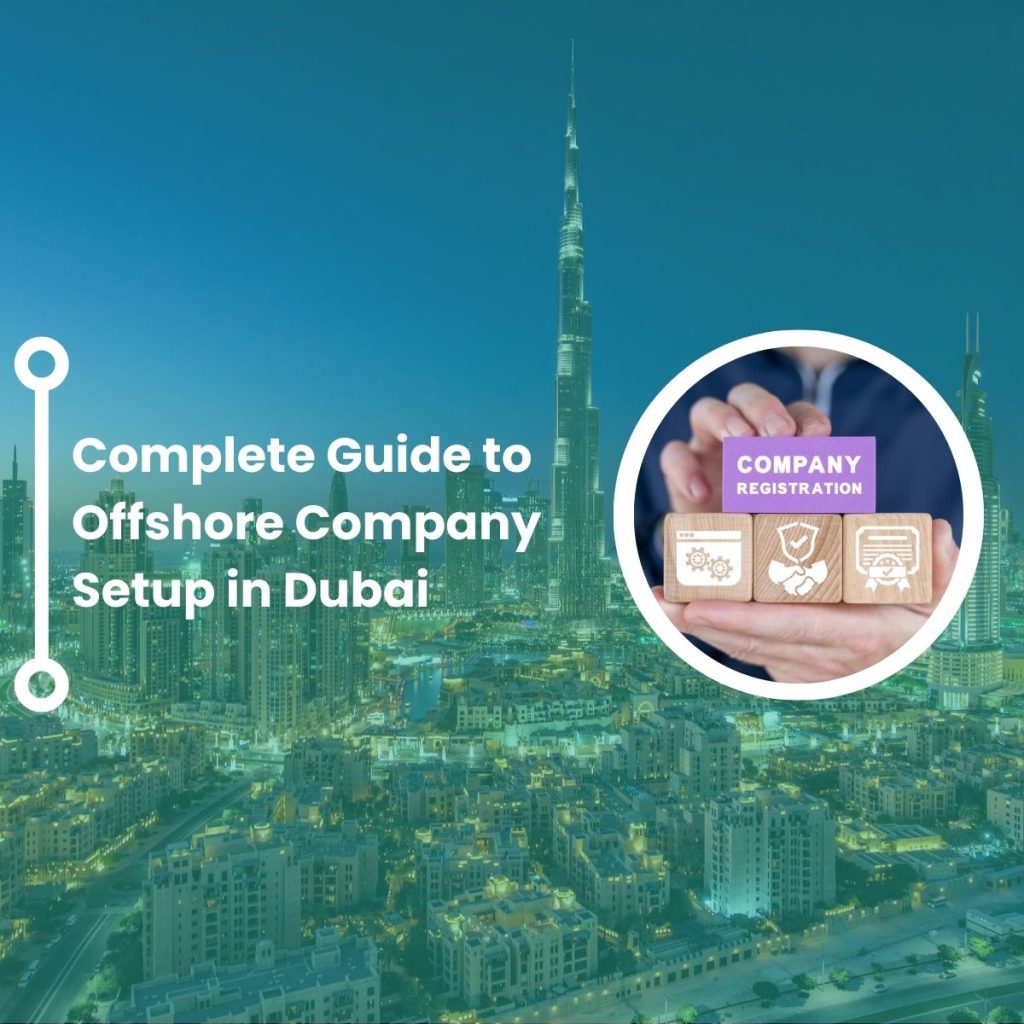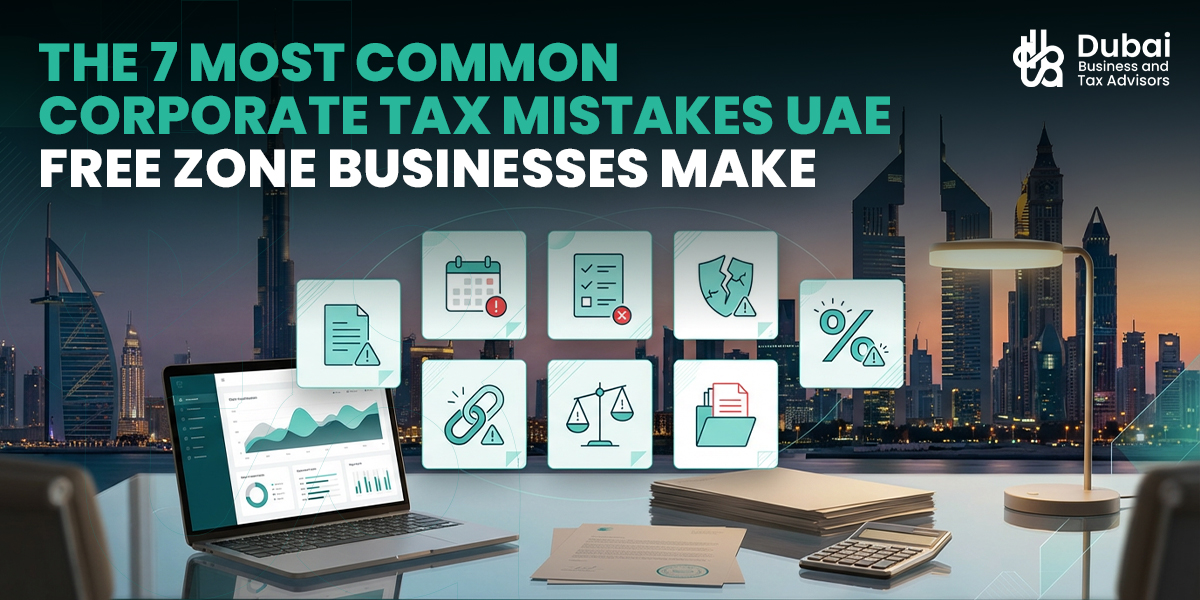Complete Guide to Offshore Company Setup in Dubai
Recent Insights

Table of Contents
Dubai’s strategic position as a crossroads of global trade makes offshore companies set up in Dubai an attractive option for international entrepreneurs. An offshore company in UAE is a legal corporate entity which is established as per the free zone directives applicable which can own assets and operate overseas. Offshore companies cannot deal with the UAE market or residents and leverage 100% foreign ownership and fast-track compliance processes that aren’t as rigid as mainland or free zone companies, but offshore company can’t do business with UAE nationals and needs to be done “outside” of the UAE. In the following guide, we drill down the legalities, advantages, and road map for the formation of an offshore company in Dubai.
What is an Offshore Company?
An offshore company is a business entity registered in a jurisdiction (usually a designated free zone) that is restricted from doing business in the domestic market of UAE. Offshore companies in UAE are regulated by free zone authorities. These legislations permit global entrepreneurs to set up a business in the UAE for international trading, holding assets, investment, and managing intellectual property. Offshore entities benefit from a business-friendly legal system with strong asset protection and confidentiality rules. For example, Ajman’s offshore laws make it clear that 100% foreign ownership and 0% tax rate are available to corporate and individual shareholders worldwide who own offshore companies in the UAE.
Why Choose Dubai for Offshore Company Formation?
Offshore Company Formation in Dubai provides the following benefits:
100% Foreign Ownership: Offshore business formation provides 100% foreign ownership. An offshore jurisdiction does not require a resident sponsor.
Tax Benefits: UAE corporate tax does not apply to most offshore companies. Since June 2023, the UAE implemented a federal Corporate Tax (CT) legislation which is 9% on profits more than AED 375,000, but offshore businesses that meet certain conditions can be eligible for a 0% tax rate (e.g., being licensed in a free zone and being compliant with Economic Substance Regulations).
Confidentiality and Asset Protection: UAE offshore companies provide a high level of privacy. The shareholders’ or directors’ details cannot be made public, ensuring confidentiality. An additional factor is the fact that offshore assets in the UAE are highly safe from creditors and lawsuits, as noted by business consultants.
Ease of Setup: The registration process is straightforward and fast. Offshore companies require minimal documentation (Passport copies, Address proof, and bank reference) and there is no minimum amount of capital needed either. There are no physical offices or visa requirements. Therefore, the formation of an offshore company can commonly be achieved within a few days.
International Trading Hub: Dubai’s world-class infrastructure and strategic location between Europe, Asia, and Africa make it ideal for global business. Having assets in Dubai can make relationships with international banks and the regional market easier.

Legal Framework and Regulatory Updates
Offshore companies in Dubai (and throughout the UAE) are established under free zone laws and are also subject to federal laws. Key regulatory frameworks include:
Federal Commercial Companies Law (CCL): The UAE’s Companies Law (Federal Decree-Law No. 32 of 2021) provides a general foundation for all corporate entities. While the CCL mainly governs mainland companies, it establishes basic principles (such as corporate governance and share structures) that influence offshore company formation.
JAFZA Offshore Companies Regulations (2023): JAFZA (Dubai’s Jebel Ali Free Zone) updated its offshore regulations recently. The new JAFZA Offshore Companies Regulations 2023 broaden permissible activities and streamline corporate requirements. For example, JAFZA now allows just one director (previously it was two), permits different share classes, and explicitly authorizes offshore entities to hold property or office leases in UAE freehold areas. Importantly, under JAFZA rules an offshore company is allowed to “hold a lease of property for use as a registered office” in approved freehold zones, “own a stake in another operating company within the UAE,” or maintain local bank accounts. These updates make offshore companies more flexible and investor-friendly.
RAK ICC Offshore Regulations: Ras Al Khaimah’s International Corporate Center is the regulator of offshore companies in RAK. In 2024, RAK ICC was empowered by Emiri Decree No. 12 of 2024 to also issue free zone commercial licenses to offshore companies. This significant change opens new business possibilities for RAK offshore companies who can now get a RAKEZ Free Zone License and start doing business in that free zone. Additionally, these RAK offshore companies with licenses may also be eligible for a 0 % Corporate Tax rate if they meet the Qualifying Free Zone Person criteria.
Ajman AFZA Offshore Regulations: Ajman Free Zone is the introduction of offshore company regulations in 2014. According to Ajman guidelines, offshore firms pay no taxes in the UAE but aren’t permitted to do business inside the country. Ajman offshore company needs to appoint a local registered agent and a minimum of one director (having corporate or individual director).

Types of Offshore Companies in the UAE
Several emirates offer offshore company registration. Each offshore area has subtle differences in allowed activities, costs, and processes. It is important to compare them (for example, in terms of incorporation fees or agent requirements) when deciding where to establish an offshore company in Dubai/UAE. The main options include:
JAFZA Offshore (Dubai): Regulated by the Jebel Ali Free Zone Authority. JAFZA International Business Company (IBC) allows 100% foreign ownership, no minimum capital restrictions, and is exempt from taxes. The company must have at least one shareholder and one director (an individual or corporate entity). JAFZA offshore companies require a local registered agent.
RAK ICC Offshore (Ras Al Khaimah): RAK ICC licenses 100% foreign-owned International Business Companies (IBCs). These have no minimum capital or auditing requirements and are tax-exempt. Recent reforms allow RAK offshore companies to obtain free zone licenses and benefit from new tax incentives. RAK offshore companies have flexibility in corporate structure and limited ongoing compliance.
Ajman AFZA Offshore (Ajman): Ajman’s offshore jurisdiction (AFZA) permits 100% foreign ownership, with no local partner needed. There is no minimum share capital and no currency restrictions. Like other offshore regimes, Ajman offshore companies cannot conduct business in UAE and do not sponsor visas.
DIFC and ADGM (Financial Free Zones): While not labeled “offshore” in UAE terminology, Dubai International Financial Centre (DIFC) and Abu Dhabi Global Market (ADGM) offer independent legal jurisdictions with 100% foreign ownership, no corporate taxes (subject to CT law rules) and robust regulatory frameworks. They are often used for financial or professional services companies targeting global markets.
Others: Umm Al Quwain Free Trade Zone (UAQFTZ) and other smaller jurisdictions also offer offshore company registration under specific ordinances.
Offshore Company Formation Process
Registering an offshore company in Dubai/UAE involves the following general steps:
Choose Jurisdiction: Decide on the preferred offshore jurisdiction (Dubai/JAFZA, RAK ICC, Ajman, etc.) based on factors like business goals, cost, and specific regulatory benefits. For example, RAK now offers expanded business license options, whereas JAFZA has the longest-established offshore regime.
Select Company Name: Propose a unique company name complying with naming rules (e.g., no offensive or religious references). Ensure the name does not conflict with existing trademarks.
Engage a Registered Agent: UAE offshore companies must apply through a licensed registered agent. The agent prepares and submits the application to the free zone registrar. Agents are also required to maintain the company’s records and communicate with authorities.
Prepare Documentation: Typical documents include passport copies of shareholders and directors, proof of address, bank reference letters, and the completed application forms. No UAE residency is required. Corporate shareholders (if any) provide corporate documents. In Ajman, nominee directors are allowed, but nominee shareholders are not.
Company Formation: Submit the application and required fees to the chosen jurisdiction’s registry. Upon approval, the offshore company is incorporated, and incorporation certificates and shares (share certificates or allotment) are issued.
Post-Incorporation Compliance: After formation, tasks include opening a bank account in the UAE (optional but common), maintaining statutory registers, and fulfilling any regulatory filings. Offshore companies are generally not required to submit audited accounts, but under UAE’s Economic Substance Regulations they must maintain documents showing adequate economic activity if they engage in certain “relevant activities” (e.g., holding intellectual property).

Required Documents
While specifics vary by jurisdiction, a standard list of documents includes:
- Passport copies of all shareholders and directors.
- Proof of address (utility bill or bank statement).
- Bank reference letter or professional reference for shareholders/directors.
- Passport photos.
- Duly signed application and memorandum of association (prepared by the agent).
- No minimum share capital deposit is generally required.
Formation timelines are typically very short (often 5–10 business days) because offshore setups do not require physical lease inspections or extensive approvals. Costs include the agent’s fees, registration fee, and annual license fee. Compared to mainland or free zone entities, offshore setup costs are low. Since no office or visa is needed, the setup cost is minimal.
Benefits of Offshore Company Formation in UAE
For foreign investors (non-residents), Dubai offshore companies are particularly attractive. UAE laws allow any foreign individual or entity to be a shareholder. Unlike mainland companies (which historically required a 51% local sponsor, now largely repealed), offshore entities are entirely foreign-owned. Although offshore companies cannot sponsor visas, shareholders and managers can still visit or relocate under separate visas (such as investor visas via property investment). In practice, an offshore company is ideal for non-residents and foreigners who seek a Dubai jurisdiction for tax and legal purposes without local market operations. Offshore companies in Dubai and the UAE offer several notable advantages:
Tax Exemption: Offshore entities pay no corporate or income tax in the UAE. (Even under the new UAE corporate tax, offshore companies which are structured to meet free zone criteria can enjoy a 0% rate). Dividends and capital gains are also tax-free.
100% Capital Repatriation: Profits and capital can be fully repatriated overseas with no restrictions. There are no currency controls, allowing free movement of funds.
Asset Protection and Confidentiality: UAE offshore laws provide strong asset protection. Shareholder identities are not public. Ajman law, for example, explicitly states that shareholder and director registers are not available to third parties. This confidentiality can help protect assets from external claims.
Global Credibility: A Dubai or UAE corporate registration enhances international business credibility and may facilitate access to global banking and investment opportunities.
Flexible Corporate Structure: Offshore companies can hold 100% foreign ownership and issue shares of different classes (in jurisdictions like JAFZA), providing flexibility in structuring investments. They may also hold shares in other UAE companies or real estate in designated freehold areas.
No Local Operations Requirement: There is no obligation to employ UAE nationals, and offshore companies are not subject to UAE labor laws. This makes administration simpler.
Ease of Expansion: An offshore entity can own subsidiaries in other jurisdictions. It can also facilitate business in multiple free zones or markets while centralizing control.
Dubai Free Zone vs Offshore Company
Many entrepreneurs confuse free zone companies with offshore companies. It is important to distinguish them. The table below highlights key differences:
| Feature | Mainland Company | Free Zone Company | Offshore Company |
|---|---|---|---|
| Ownership | Up to 100% foreign (after 2020 law); some activities may require Emirati partner. |
100% foreign ownership. |
100% foreign ownership. |
| Permitted Business | Can trade anywhere in UAE (including mainland, free zones, and internationally). |
Limited to activities within that free zone or abroad. No direct mainland business without a local agent. |
Cannot conduct business within UAE; allowed to trade internationally or hold assets abroad. |
| Physical Office | Mandatory (minimum office size varies by emirate). |
Required per free zone rules (virtual to full office options). |
Not allowed; office must be outside UAE. |
| Visa Eligibility | Can sponsor residence visas based on office size. |
Can sponsor visas (number depends on office space). |
Cannot sponsor any UAE residence visas. |
| Corporate Tax (2025) |
9% on taxable income above AED 375,000. |
0% (subject to qualifying free zone incentive conditions). |
0% (if structured through a free zone license). |
| Setup Cost & Complexity |
High (license, office, visas, compliance). |
Medium – varies by free zone (license + office + visa). |
Low, no office or visas required, minimal fees. |

Corporate Tax and Compliance
UAE Corporate Tax Regime
Since June 2023, the UAE levies a federal Corporate Tax (CT) at 9% on profits exceeding AED 375,000. However, offshore entities typically enjoy a 0% effective tax rate if they qualify as a Free Zone Person.
Tax Benefits for Free Zone Entities
Under the new CT law, a Qualifying Free Zone Person (QFZP) can benefit from 0% tax on its qualifying income. For example, an offshore company in RAK that obtains a RAK ICC Free Zone Commercial License qualifies as a QFZP and thus may pay 0% tax on its eligible income.
Qualifying Free Zone Person (QFZP) Status
The Federal Tax Authority provides guidelines confirming that qualifying income from transactions wholly within free zones remains tax-free, while transactions with mainland or outside UAE may be taxed if not “qualifying.”
Compliance with Economic Substance Regulations (ESR)
Although offshore companies do not directly conduct trading activities within the UAE, they remain subject to UAE laws, including Economic Substance Regulations (ESR). If offshore companies engage in activities (such as managing intellectual property, delivering financial services, or holding assets), they have to prove they have an actual local presence. This might include having local bank accounts, directors, or management. Failure to comply with the ESR rules can lead to fines, but simple holding companies usually don’t face the toughest requirements.
VAT Obligations for Offshore Entities
Regarding Value Added Tax (VAT), offshore companies generally have no tax liability unless they conduct VAT related activities in the UAE. Since offshore entities cannot trade with UAE mainland customers, they typically remain outside the scope of VAT. However, if an offshore company later engages in mainland business or real estate, it must comply with VAT registration rules.
Accounting, Reporting, and Regulatory Requirements
For full compliance, offshore companies should maintain proper accounting records and file any required reports (even though audit requirements are minimal). As an example, Ajman law notes that offshore companies should keep financial statements and economic records for 10 years. Moreover, offshore companies that obtain free zone licenses must comply with annual license renewal requirements and fulfill any audit or company secretarial obligations as specified by the relevant free zone authority.
Dubai Business and Tax Advisors’ Support
Establishing and running an offshore company in Dubai involves navigating regulatory nuances and paperwork. Dubai Business and Tax Advisors (DBTA) specializes in this process. By partnering with Dubai Business and Tax Advisors, clients benefit from local knowledge and experience to avoid pitfalls and ensure their offshore company formation in Dubai is successful. Our tailored approach means you can focus on your international business while we handle UAE legalities. Our firm provides end-to-end services for offshore company registration and maintenance in the UAE. Key ways DBTA supports offshore setup include:
Jurisdiction Selection: We analyze your business goals and recommend the most suitable offshore jurisdiction (JAFZA/Dubai, RAK, Ajman, etc.), ensuring compliance with current laws and maximizing benefits.
Company Registration: DBTA handles name reservation, document preparation, and submission to the offshore authority through licensed agents, expediting approvals.
Corporate Structuring: We assist in establishing appropriate shareholding and directorship structures, including nominee arrangements where applicable, while leveraging jurisdiction-specific features such as multiple share classes and single-director allowances.
Banking and Post-Registration Services: Our team helps open UAE bank accounts for your offshore company and provides registered office services. We also manage ongoing filings and license renewals, ensuring compliance with Economic Substance Regulations, including reporting obligations and, where applicable, demonstrating adequate local presence and activity.
Tax and Legal Advice: DBTA keeps you informed about UAE tax developments (such as corporate tax and free zone rules). We ensure your offshore company remains eligible for tax incentives and assist in preparing for audits or regulatory changes.
FAQs
To register an offshore company in Dubai, you first need to choose a jurisdiction like JAFZA, RAK ICC, or Ajman. Select a business name, select a registered agent, and gather all the necessary paperwork such as passport copies and proof of address. The application form is sent through the agent, and the registration fee is paid. Once approved, you will be given the certificate of incorporation. This Dubai offshore company formation process is fast and cost–effective and is perfect for international business, wealth management, and tax planning. With no office or visa requirement locally, it is also one of the cheapest ways to go global.
You can establish an offshore company in Dubai by liaising with a licensed registered agent such as Dubai Business and Tax Advisors who will manage the complete formation of the company. Choose your preferred offshore jurisdiction (RAK, JAFZA, or Ajman), provide documents such as your passport and proof of address, and define your share structure. There are no restrictions on foreign ownership and no physical office or local staff is required by offshore companies. The setup process is smooth, fully legal, and designed for non-residents looking to expand globally. Offshore company registration in Dubai typically takes just 5–7 business days.
Offshore company setup in Dubai is highly cost-effective. Expect to invest between AED 8,000 to AED 15,000 depending on the jurisdiction and services selected. This also includes federal registration, licensing fees, and agent process fees. You won’t have to rent office space or hire employees, as you would on the mainland, and that drastically reduces your startup costs. Some additional services, such as document attestation, opening of a bank account in the UAE, or nominee directors may be charged separately. Compared to other business structures, offshore company formation in Dubai offers excellent value for investors seeking global reach with minimal financial commitment.
Yes, you as a foreign agent or company can own up to 100% of an offshore company in Dubai with provisions for repatriation of your profits back to your country. Non-residents are welcome as no taxation and reporting requirements with UAE offshore company law giving you a low cost and straightforward tax–efficient solution for international trade, IP holding or asset protection. No, you do not need any UAE residence visa or local sponsor. Foreigners often establish offshore companies in Dubai as a strategic base for global business operations. With professional assistance from companies like Dubai Business and Tax Advisors, expats are able to incorporate their business within days and with maximum compliance.
One of the biggest benefits among others in setting up an Offshore Company in Dubai is the exemption from taxes. Offshore companies in the UAE are usually exempt from the UAE corporate tax, income tax and value added tax (VAT), provided that it does not engage in any onshore or local business in the country. Despite the implementation of UAE Corporate Tax, properly structured offshore companies, particularly under free zone systems, can still be eligible for a 0% tax rate. This makes offshore business setup in Dubai 2025 an attractive route for global entrepreneurs looking for legal, low-tax jurisdictions. Always consult professionals like Dubai Business and Tax Advisors to ensure compliance.
To register an offshore company in Dubai, you’ll need basic yet essential documentation. Typically, this includes:
- A valid passport copy of each shareholder and director
- Proof of address (e.g., utility bill or bank statement)
- Bank or professional reference letter
- Passport-sized photos
- A completed application form
Depending on the jurisdiction (RAK ICC, JAFZA, or Ajman), additional documents might be requested for corporate shareholders.
Offshore company formation in Dubai is remarkably fast. On average, the setup takes between 3 to 7 working days, depending on the jurisdiction and completeness of your documents. Jurisdictions like RAK ICC and Ajman offer streamlined processes that allow rapid approval. Once the required paperwork is submitted and verified through a registered agent, you receive your incorporation certificate and can begin business operations immediately. With zero office space or visa requirements, the process is faster than mainland or free zone setups. For a seamless experience, consider expert guidance from Dubai Business and Tax Advisors.
Conclusion
Offshore companies in Dubai are a solid platform for wealth optimization, tax planning, and foreign trade. Whether you are a foreign investor based overseas or a company abroad in need of a strategic base, the advantages of forming an offshore company in Dubai are too good to ignore. These advantages include 100% ownership, tax breaks, and a strong legal system. Considering recent changes in regulations and tax laws, it is important to plan carefully to maximize benefits.
This guide has covered the details of Dubai offshore company setup, from the legal infrastructure and benefits to the step-by-step process and comparison to free zone and mainland structures. Working with consultants such as Dubai Business and Tax Advisors means that your offshore structure is professional and compliant with UAE legislation. For readers seeking to navigate this process in 2025, the UAE offers vast opportunities for foreign ownership, and ongoing reforms make it an ideal time to establish an offshore entity in Dubai.
Latest news & articles

The 7 Most Common Corporate Tax Mistakes UAE Free Zone Businesses Make: Avoiding the 5-Year Disqualification
Read More »
AED 10,000 Mistake: What Happens If You Miss the UAE Corporate Tax Registration Deadline?
Read More »About the Author:
AURANGZAIB CHAWLA
As CEO of DBTA, Aurangzaib Chawla advises globally mobile businesses and individuals on cross-border tax planning and structuring. With expertise spanning the UK, UAE, and wider GCC, Zaib helps clients minimise double taxation, protect assets, and achieve long-term financial efficiency while staying fully compliant.
Planning to launch in Dubai or the UAE?
Let’s talk about how to structure your business for growth the smart, compliant, and tax-efficient way
About the Author:
AURANGZAIB CHAWLA

As CEO of DBTA, Aurangzaib Chawla advises globally mobile businesses
and individuals on cross-border tax planning and structuring. With expertise spanning the UK, UAE, and wider GCC, Zaib helps clients minimise double taxation, protect assets, and achieve long-term financial efficiency while staying fully compliant.
Planning to launch in Dubai or the UAE?
Let’s talk about how to structure your business for growth the smart, compliant, and tax-efficient way.



